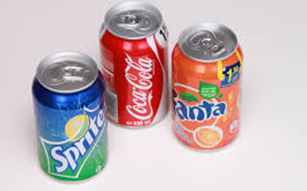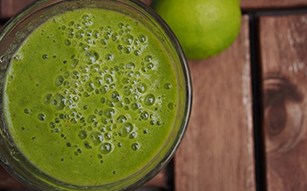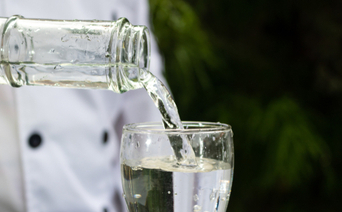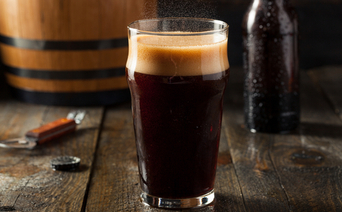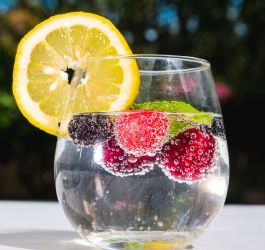There are many health benefits of drinking coconut water. Coconut water, the liquid inside young green coconuts, has been consumed throughout the world for centuries. Today, experts often tout coconut water as a health drink and as a replacement for sports beverages that replenish electrolytes. With its high quantity of potassium and low fat content, coconut water is both good for you and good for your waistline.
What Is Coconut Water?
Imagine a beach filled with beautiful coconut trees swaying in the breeze. Some coconuts are the fuzzy brown-skinned bowling balls you see in the supermarket, but the young, immature coconuts are green and clustered tightly near the tops of the trees. These are the sought-after coconuts for coconut water, the young green fruits of the coconut palm.
When coconuts mature, the coconut “meat” you know from your favorite bakery treats and candy bars begins life as a liquid. This white, watery liquid is first known as coconut water, then coconut milk. Over time, it forms the flesh of the coconut itself.
Coconuts used for coconut milk are the same as those raised for their meat. The green coconuts are harvested at about five to seven months of age, and then the water is extracted from the interior, packaged, and sold as a beverage.
Nutritional Value of Coconut Water
Little-known fact: Coconuts are technically nuts and classified as such. The interesting thing about coconut water is that it contains plenty of healthy ingredients associated with mature nuts but without the fat content. The nutritional value of coconut water is as follows:
Serving size: 1 cup (240 grams)
- Calories: 46
- Total fat: 0
- Fiber: 3 grams
- Sugar: 6 grams
- Protein: 2 grams
Among the many vitamins and minerals found in a cup of coconut water, the beverage is rich in Vitamin C, calcium and iron. However, it’s best known for its plentiful potassium component. In fact, this is why coconut water is good for you and accounts for one of the many health benefits of coconut water.
Coconut Water or Coconut Milk?
Water, milk, what’s the difference? Plenty when it comes to coconut water, so be careful when shopping for this product.
Coconut water contains 46 calories in one cup. Coconut milk contains a whopping 552 calories per cup. Keep in mind that coconuts are actually giant tree nuts, similar to a walnut but much, much bigger. Like nuts, coconuts are higher in fats, and while they tend to be beneficial fats, they pack an enormous amount of calories per ounce.
It’s fine to add a teaspoon of coconut milk to make a yummy curry, but don’t confuse the two and consume cup after cup of coconut milk. You’ll pack on the pounds quickly.
Benefits of Drinking Coconut Water
As with any health product, you’ll see claims of the benefits of drinking coconut water that range from the sublime to the ridiculous. Some companies state their product will cure just about everything while simultaneously making you look like a super model, while others state more modest benefits. Sorting the facts from fiction is difficult, but let’s start with what native cultures have long known about coconut water: it’s great hydration.
Sports Hydration
Water is, of course, the best and most freely available liquid to quench your thirst. But when you’re thirsty, you have myriad choices. You can choose many beverages including fruit juices, iced teas and sports drinks to rehydrate.
Athletes often choose sports drinks to rehydrate after a particularly strenuous workout or competition to replenish their electrolytes. There’s some evidence that coconut water may be just as good, if not better, than sports drinks for this purpose.
Each serving of coconut water contains 6 grams of natural sugar as well as protein, fiber, vitamins and minerals. Potassium, sodium, magnesium and calcium are all important electrolytes to help your body recover. These four minerals work together to prevent muscle cramps, for example, and help regulate blood pressure and heart rate.
The naturally occurring fiber found within coconut water balances out the natural sugars. Fiber slows down digestion, and prevents the “sugar rush” that happens when you gulp down a sweetened drink like a soft drink or a commercial fruit punch beverage. Fiber helps your body release sugar through digestion at an even rate so you don’t feel that rush followed by a crash and the accompanying fatigue.
Sports beverages can certainly replenish electrolytes and provide sugar for energy, but they fail to include fiber to help absorb sugars more slowly. Coconut water may also have fewer calories than a comparable cup of a commercial sports drink, depending on the brand and the ingredients in the sports beverage.
Ounce for ounce, coconut water may actually be a better health beverage for those participating in sports, training for an event or working out.
Hangover Cure
It’s a great idea to have coconut water on hand after a night out partying. Stock up on it before your New Year’s Eve party, for example, to offset the side effects of too much alcohol.
When you drink too much alcohol, you may be sick to your stomach or urinate frequently. Both can leave you dehydrated and low on important electrolytes like potassium, magnesium and sodium.
Your body also has to work harder to neutralize the alcohol flowing through your system. As your liver process the alcohol, it needs water to wash out the toxins from your system through your urine. All liquids help, but water or an electrolyte-infused beverage like natural coconut water provide the raw materials that support natural detoxification.
Coconut water’s electrolytes may help prevent a bad hangover, or make your hangover shorter. While it won’t cure a hangover, anything that can help shorten the duration or intensity is probably welcome.
Lower Blood Pressure
It seems like everywhere you turn, you read about the dangers of sodium in the diet. Sodium is associated with higher cardiovascular disease risks and a higher than average risk of high blood pressure. Doctors often caution people with cardiovascular disease and high blood pressure against excess sodium intake. But, did you know that it’s not all about sodium, but more about the ratio of sodium to other minerals in your body?
Research from the National Institute of Health’s Heart, Lung and Blood Institute studied the combined effects of potassium and sodium on blood pressure. They discovered that a high ratio of sodium to potassium in the diet increased the risk of high blood pressure.
Americans generally consume too much sodium and not enough potassium. According to the NIH, the average amount of sodium consumed is 3300 milligrams per day, while most Americans consume approximately 2600 milligrams of potassium.
If you reverse those numbers, you’re close to what the NIH and others recommend as healthy. The recommendation for optimal blood pressure and to reduce cardiovascular disease risk is 2300 mg or less of sodium and 4700 mg or more of potassium per day. Less than 13 percent of the population meets this goal.
Where can you find potassium in your diet? Most people know that bananas are a good source of potassium, but all fruits and vegetables contain plentiful amounts of potassium and low amounts of sodium. It’s as if nature knows what’s best for us in the fruits, vegetables, raw nuts and other natural ingredients we consume, and provides the ideal ratio right from the tree, bush or plant.
Processed foods, on the other hand, tend to have very high amounts of sodium. Sodium helps preserve the flavor, texture and color of food to extend its shelf life. It can cover some of the less pleasant flavors lingering from processing. And let’s face it, salt tastes good.
We do need salt in our diets, but too much of any one thing isn’t good for us. We crave salt because it’s necessary for life, and in ancient history, was difficult to obtain. Now that people live on fast food, frozen dinners, and processed snack foods, it’s too easy to overindulge in sodium and not get enough potassium in your diet.
That’s where coconut water can help. Coconut water is low in sodium and rich in potassium. As part of a healthy diet, it can provide some potassium to improve your daily intake of this important nutrient. It’s also easy to incorporate coconut water into delicious beverages that contain plentiful fruits and vegetables, so you’re increasing your intake of natural sources of potassium easily to change the balance of sodium and potassium in your diet.
Lower Cholesterol and Triglycerides
Cholesterol and triglycerides occur naturally in your body, but too much can hurt your cardiovascular health. Cholesterol is a sticky fatty substance that acts like spackle over microscopic “cuts” in the circulatory system. If too much cholesterol builds up, it can create blockages that cause heart attacks or strokes. A high cholesterol rate, especially a high LDL or “bad” cholesterol reading compared to HDL and “good” cholesterol, as well as high triglycerides, are factors in cardiovascular disease.
Coconut water may help to lower both cholesterol and triglyceride levels. Studies on rats indicate it may protect against heart disease by decreasing both LDL cholesterol and triglyceride levels. Moreover, although scientists don’t really know why it works, it offers additional protection to the heart. So drink coconut water and toast your cardiovascular system – it may be beneficial to heart health.
Stress and Anxiety Reduction
Coconut water contains plenty of minerals including potassium, sodium, calcium and magnesium. What you may not know is that two of these minerals, calcium and magnesium, are important for relaxation and sleep.
Calcium builds strong teeth and bones, but it also keeps the smooth muscles in your body relaxed. Your heart is made of smooth muscle tissue. Adequate amounts of calcium are vital to help your heart relax between beats, which keeps it healthy. It also helps your brain slow down at night, falling into the brain patterns that mark sleep. Adequate amounts of calcium help you fall into a deep, restful sleep.
Magnesium too offers many health benefits. It’s known as the relaxation mineral because studies have shown that magnesium helps the parasympathetic nervous system relax. The parasympathetic nervous system is what helps to control your “fight or flight” instincts. When it’s off, you feel anxious and may be prone to anxiety and panic attacks as well as sleep disturbances.
The National Sleep Federation says that six out of 10 people aren’t getting enough sleep at night. While it is true that many people deprive themselves of sleep to work, play on the computer or just enjoy a movie-night binge, one hidden cause of insomnia may be a calcium and magnesium deficiency. Low levels of calcium and magnesium can cause you to wake up in the middle of the night and be unable to fall back to sleep again.
Like the partnership of sodium and potassium, calcium and magnesium are also partners, working together to help your body sleep naturally. Coconut water, already rich in both sodium and potassium, is also rich in magnesium and calcium. So it’s a natural sleep aid and can help you both fall asleep easily and sleep more deeply. Combined with a healthy diet, coconut water can help many aspects of your health.
Weight Loss
Another of the many benefits of drinking coconut water is that it may help with weight loss. Coconut water does contain calories (46 per cup), while plain water contains zero calories. Nevertheless, some people dislike drinking plain water, and a twist of lemon or lime doesn’t always improve the taste. Drinking coconut water may be the answer.
Mistaking thirst signals for hunger pangs may lead some people to eat instead of drink. For these people, a cup of coconut water may both slake their thirst and give them the taste they crave. Liquids also fill the stomach with fewer calories than food, cutting down on the total caloric intake for the day.
Commercial diet and weight loss programs recommend drinking multiple glasses of water a day, usually 8 to 10, to feel full and prevent snacking. Coconut water can replace one or two of these glasses of water for a healthy beverage that provides vitamins, minerals and protein without fat and excess calories.
Incorporating Coconut Water Into Your Diet
You can drink coconut water by the cup, if you like. It has a sweet taste. Some say it tastes like you stuck a straw in a coconut. Buy a high-quality brand, such as coconut water sold by Beverage Universe. Cheap coconut water is often diluted with other ingredients, which can make it taste a little like suntan lotion. Unless you’ve got a craving for that, stick with good brands.
You can mix coconut water into many different drinks. Smoothies work best, but other cool drinks work well too, and you can freeze coconut water into desserts, too. Here are a few recipes for incorporating more coconut water into your diet.
Coconut Water Lemonade
This drink packs the taste of summer into one low-calorie beverage. Simply mix one cup of coconut water with a squeeze of fresh lemon juice. Add a squeeze of lime, too, and you’ve got a tropical paradise in a cup.
Coconut-Pineapple Popsicles
Puree one cup of fresh pineapple with two cups of coconut water. Pour into popsicle molds and freeze.
A variation on this recipe is to mix one cup of pureed strawberries with coconut water. It also freezes into strawberry-sweet popsicles for a hot summer day!
Coconut Water Fruit Pops
This is a spin on the recipe above. Simply add chopped fruit to the mix, especially brightly colored berries like strawberries and blueberries. You can also pour straight coconut water into popsicle molds and then add fruit. The liquid freezes to a crystalline pop studded with fruit. It’s as delicious as it is beautiful.
Coconut Water Coffee
No, that’s not a typo. Coconut water coffee may just replace your morning java fix. Combine 1 teaspoon powdered espresso with 1/2 cup of boiling water. Mix, then add 1 tablespoon of sweetened, condensed milk and half a cup of coconut water. Add ice, chill, and you’ve got an amazing beverage.
Blueberry-Beet Coconut Water Smoothie
Don’t gag at the word “beet.” This recipe from Epicurious packs so many antioxidants into a glass it’s like jet fuel for your cells. You need 1 cup of frozen blueberries, 1/2 cup of peeled and grated raw beet, 1/2 cup of low at Greek yogurt, and 3/4 cup of coconut water. Just pour them all into your blender, and blend for one minute or longer until smooth. It’s a purple-red concoction that tastes sweet and zippy at the same time.
Peach-Yogurt-Coconut Water Smoothie
This recipe uses fresh peaches, coconut water and Greek yogurt for a healthy beverage. Simply cut the peach flesh away from the pit and chop it into chunks. Add it to your blender along with 1 and 1/2 cups of coconut water and 1 cup of non-fat Greek yogurt. Blend into a smoothie, and then add ice cubes until it reaches the consistency you want. You may need one more peach to get a strong peach flavor in the drink. Serves two.
Health Benefits of Coconut Water: It’s Good for You!
Given all of the health benefits of coconut water, is it hype or hope, fact or fiction?
Studies certainly demonstrate that coconut water is good for you. It is low in calories, and contains healthy amounts of protein, vitamins and minerals. The vitamins and mineral content may contribute to a healthy cardiovascular system including lower blood pressure and cholesterol readings.
It’s a good drink for sport hydration, and includes the electrolytes that commercial beverages contain without the artificial colors, flavors, and sugars often associated with such products. Whether or not you enjoy it is a matter of taste, since some people love the taste of sports beverages. But you can certainly substitute a healthy can of coconut water instead of a sports drink and obtain additional nutrients in the process.
Coconut water may help with weight loss, especially if you substitute it for eating between meals. It’s versatile enough to incorporate into a wide range of beverages and treats, including popsicles and smoothies, which make it a pleasant summer treat.
Is coconut water good for you? Yes, and it can be part of a healthy diet that supports your overall active lifestyle. People in the tropics have known for centuries that coconuts, especially young coconuts, offer many health benefits. Thankfully, with modern packaging, processing and shipping methods, people worldwide can enjoy the health benefits of coconut water now, too.
Coconut Water from Beverage Universe
Coconut water is available nationwide from a variety of stores, but Beverage Universe has the best flavors on the market. Beverage Universe coconut water comes packages in handy individual portions, which makes it great to carry on the trail or strapped to your bike during workouts or events. Flavors such as grape, fruit punch and berry also make it a tasty and healthy treat on the go.
Beverage Universe offers a large selection of brands and flavors. We offer the best coconut water brands and we sell Coconut Water in bulk
Visit our website to shop for coconut water products today.
Check out our blog post on How much water I should drink in a day


